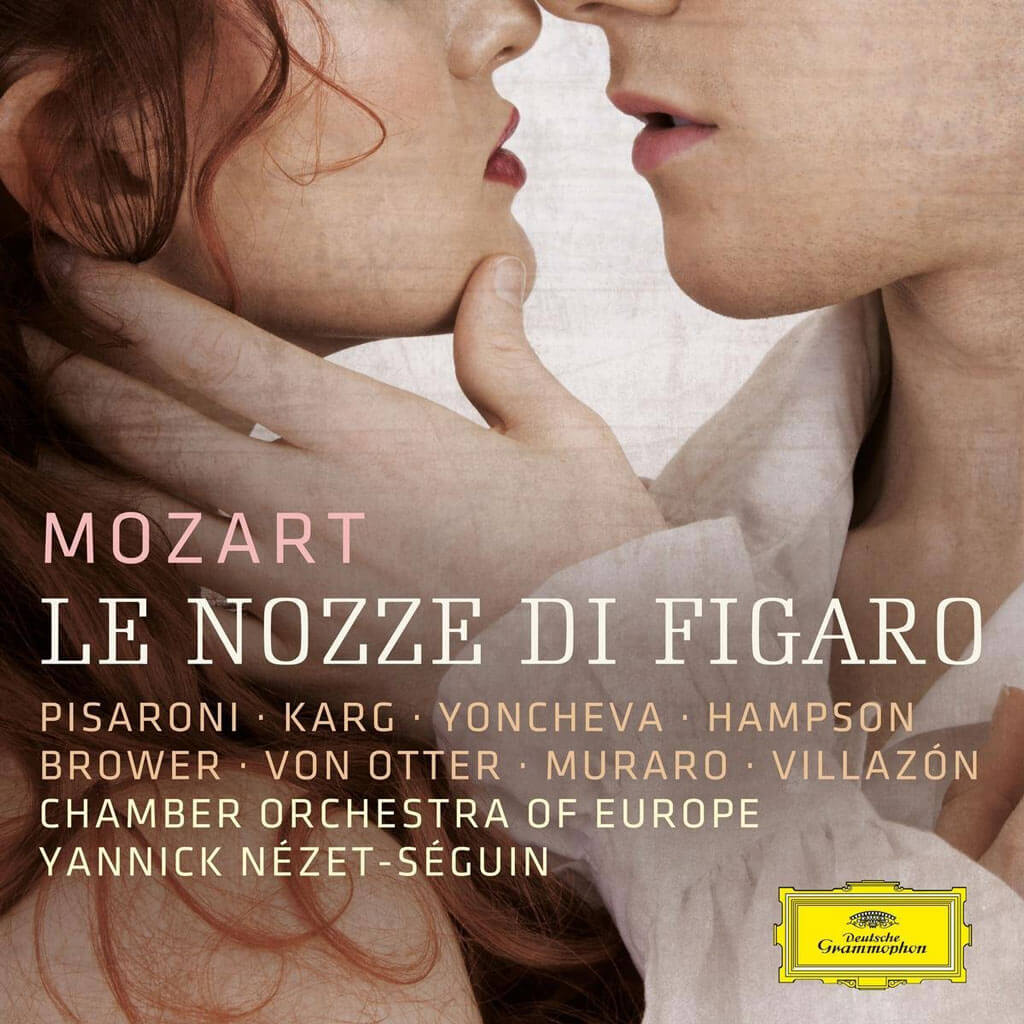
This is the latest instalment in DG’s cycle of Mozart operas, conducted by Yannick Nézet-Séguin. The other constant in the cycle is tenor Rolando Villazon, who here takes the small role of the music teacher, Basilio. As regular readers of this column will know by now, I am a great admirer of Yannick’s conducting, and the Mozart operas recorded thus far all sound fresh and full of energy. This latest release is no exception, although I do have some major reservations.
Let’s start with the positives. This is luxury casting by any standard, down to the smallest role; for example, Soprano Regula Mühlemann as Barbarina (a role often given to a neophyte in your average Figaro production) is simply superb in her Act 4 cavatina and Villazon, outstanding both vocally and dramatically, gives us a sparkling, comic Basilio. The audience laughter is clearly audible in this live performance, whenever he takes the stage.
Christiane Karg as Susanna and Luca Pisaroni make an ideal pair in this performance, with especially impressive warm and solid low notes from Karg in the aria “Deh vieni non tardar.” As the Countess, Bulgarian soprano Sonya Yoncheva, who has been singing major roles to great acclaim at the Met since 2013, sings beautifully here, with innumerable subtle nuances of phrasing.
Thomas Hampson as the Count has lost some of the sustaining power he used to have earlier in his career. His low notes, for example, are thin and the highly ornamented passages he sings are not as clean as one would like to hear them. At the climactic moment in Act 4, in the aria “Contessa, perdono,” he sounds more grand-fatherly than the arrogant but ultimately forgiving young nobleman Beaumarchais and da Ponte intended him to be. Most scholars put the age of this character in the opera at about 26. Hampson has had a great career, but perhaps the time has arrived for him to retire some of his roles.
Yannick Nézet-Séguin elicits wonderful playing from the Chamber Orchestra of Europe, deftly combining a traditional approach to Figaro with some touches of historically informed performance practices. Tempi are on the quick side, but Yannick throttles back when it is appropriate. His tempo for the afore-mentioned Act 4 cavatina is very slow and the vibrato in the muted string accompaniment decidedly heavy-duty, but the music can stand it – indeed, cries out for it. And while many conductors take the Act 4 finale “Corriam tutti” at top speed, Yannick’s tempo is simply hair-raising.
Whether it is the fault of DG’s engineers or a section that is too small, the first violins are rarely heard to full effect in this recording; in arias such as Basilio’s “In quegli anni in cui val poco” or Figaro’s “Aprite un po’quegli occhi”, for example, important violin figuration is almost inaudible. Vocal and orchestral lines of equal prominence are very much a part of Mozart’s operatic style; the fact that they are not, on this recording, is a serious deficiency.
When I want to hear this music in all its glory, I will go back to recordings conducted by Erich Kleiber, Karl Böhm and Herbert von Karajan; that said, Yannick Nézet-Séguin’s fresh and energetic Figaro, with its mostly stellar cast, offers plenty of musical pleasure.
#LUDWIGVAN
Want more updates on Toronto-centric classical music news and review before anyone else finds out? Get our exclusive newsletter here and follow us on Facebook for all the latest.
- SCRUTINY | TSO Lets Berlioz Do The Talking In Season Opener - September 21, 2018
- RECORD KEEPING | Even Yannick Nézet-Séguin Can’t Make Us Love Mozart’s La Clemenza di Tito - September 6, 2018
- RECORD KEEPING | Giovanna d’Arco With Anna Netrebko Explains Why The Best Operas Survive - August 30, 2018



